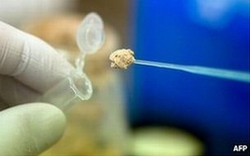 QK Meats, based in Naas, County Kildare in the Irish Republic, has been suspended as a supplier to the firm.
QK Meats, based in Naas, County Kildare in the Irish Republic, has been suspended as a supplier to the firm.In a statement, Birds Eye said their investigations had established that this was the one isolated source.
QK Meats said it had "never knowingly incorporated horsemeat into any of its beef products".
It added that as a result of Birds Eye's claims it has "launched a full investigation into its supply chain".
'Independent tests'
In late February, tests on Birds Eye spaghetti bolognese, 340g, and beef lasagne, 400g, were found to contain horse DNA. They were removed from the supermarket shelves.
In its statement on its website, addressed to customers and consumers, Birds Eye said: "Our investigation has shown that Frigilunch N.V. (who supplied these products to us) was itself supplied meat with horse in it by an Irish meat processor QK Meats.
"Frigilunch N.V.'s own independent tests and investigation have confirmed our findings. We have reported these findings to the Food Standards Agency and Frigilunch N.V. has taken immediate action and suspended them as a supplier of meat.
"All other meat suppliers to Frigilunch N.V. have been given the all clear through both Birds Eye's and Frigilunch N.V.'s separate testing programmes.
"You can rest assured that all other suppliers to Birds Eye have also been given the all clear."
Frigilunch N.V. is based in Belgium.
The BBC asked QK Meats for a response to Birds Eye's claims.
'Exemplary record'
In a statement, the County Kildare firm said: "The quality and safety of our products is of the utmost importance to QK Meats.
"The company has been operating for the past 25 years and has an exemplary record in terms of food quality and safety standards. QK Meats has never knowingly incorporated horsemeat into any of its beef products.
"Following the discovery of equine DNA in product allegedly supplied by QK Meats to Frigilunch NV, a supplier to Birds Eye, QK Meats has launched a full investigation into its supply chain," the Irish company added.
Birds Eye said they were introducing a "triple lock" DNA testing programme which means no minced beef product can reach the supermarket shelf without have been cleared at three stages of DNA testing.
A press officer for the Republic of Ireland's Department of Agriculture said an investigation into the issue of the mislabelling of meat in Ireland was ongoing.
She said the department was not in a position to comment further at this stage.





